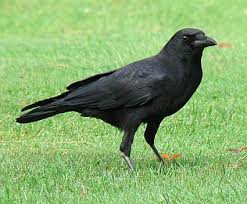记忆方法
1. imitative of bird's cry.
2. cry => crow.
3. Like the word cry, crow is also the imitative of bird's cry.
4. cr- (拟声) => cry, crow, croak, crack.
5. Sound of Crows: https://www.youtube.com/watch?v=eM4E9enGqRc
6. 模拟、拟声自乌鸦的叫声。
2. cry => crow.
3. Like the word cry, crow is also the imitative of bird's cry.
4. cr- (拟声) => cry, crow, croak, crack.
5. Sound of Crows: https://www.youtube.com/watch?v=eM4E9enGqRc
6. 模拟、拟声自乌鸦的叫声。
中文词源
crow 乌鸦
拟声词,模仿乌鸦的叫声。比较crane, cock.
英语词源
- crow
-
crow: [OE] The verb crow began in prehistoric West Germanic as an imitation of the harsh call of the cockerel. Its relatives still survive in other Germanic languages, including German krähen and Dutch kraaien. Early examples of birds other than cockerels being described as ‘crowing’ are comparatively rare, but nevertheless there seems no doubt that the verb formed the basis of the name given to birds of the genus Corvus [OE]. The crowbar [19] was so named from the resemblance of its splayed end to a crow’s foot.
- crow (n.)
- Old English crawe, imitative of bird's cry. Phrase eat crow is perhaps based on the notion that the bird is edible when boiled but hardly agreeable; first attested 1851, American English, but said to date to War of 1812 (Walter Etecroue turns up 1361 in the Calendar of Letter Books of the City of London). The image of a crow's foot for the wrinkles appearing with age at the corner of the eye is from late 14c. ("So longe mote ye lyve Til crowes feet be growen under youre ye." [Chaucer, Troilus and Criseyde, c. 1385]). Phrase as the crow flies recorded from 1800.
- Crow
- Indian tribe of the American Midwest, the name is a rough translation of their own name, Apsaruke.
- crow (v.)
- Old English crawian "make a loud noise like a crow" (see crow (n.)); sense of "exult in triumph" is 1520s, perhaps in part because the English crow is a carrion-eater. Related: Crowed; crowing.
权威例句
- 1. She gave a little crow of triumph.
- 她轻轻地发出了胜利的欢呼声。
- 2. I saw a man leveling a gun at a crow.
- 我看见一个人正用枪瞄准一只乌鸦.
- 3. The crow of the cock is a harbinger of dawn.
- 鸡啼报晓.
- 4. The wings of a crow can never cover up the sun.
- 乌鸦的翅膀遮不住太阳.
- 5. The rooster's crow woke me.
- 公鸡的啼叫声把我吵醒了.

